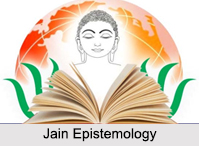 Jain Epistemology is identified with Atman. This signifies that to understand the nature of Knowledge in Jain Epistemology, is to comprehend the nature of atman. Man always carries certain convictions, which he claims as knowledge. However, he finds that not all his convictions carry the same value at all times, in the given situation. This awareness of distinction of truth and falsity leads him to enquire into the origin and validity of all knowledge. Such a systematic study of knowledge is known as "Epistemology".
Jain Epistemology is identified with Atman. This signifies that to understand the nature of Knowledge in Jain Epistemology, is to comprehend the nature of atman. Man always carries certain convictions, which he claims as knowledge. However, he finds that not all his convictions carry the same value at all times, in the given situation. This awareness of distinction of truth and falsity leads him to enquire into the origin and validity of all knowledge. Such a systematic study of knowledge is known as "Epistemology".
Concept of Jain Epistemology
Epistemology is the branch of science which studies or enquires into the different aspects of knowledge such as nature of knowledge, different sources or types of knowledge, validity of knowledge, relationship between the knower and the known and so on. All the schools of Indian Philosophy deal with this part of Philosophy and are engaged in the systematic enquiry of Knowledge.
Jain Theory of Knowledge
Indian Philosophers in their theories of knowledge, attempt to formulate the inter-relationship among Pramata (knower), Prameya (object of knowledge), and Prama (cognition) through the number of Pramanas (sources or means of knowledge) and discuss their nature and criteria validity (Pramanya).
Generally, there are six fundamental ways or means accepted in Indian philosophy to recognize an object. They are called "Pramanas", instruments of true cognition. These are as follows;
1. Pratyaksa - Perception
2. Anumana - Inference
3. Sabda - Verbal testimony
4. Upamana - Comparison
5. Arthapatti - Imposition
6. Anupalabdhi - Non-availability
Different schools of Philosophy accept different number of Pramanas and they have their reason for it. Jains accept the three Pramanas which are most fundamental. These are Pratyaksa, Anumana and Sabda.
Sutra for Jain Epistemology
Following are some Sutras in Tattvartha Sutra, which are concerned with knowledge:
The enlightened worldview, enlightened knowledge and enlightened conduct are the paths to liberation.
The enlightened worldview may arise spontaneously or though learning.
The categories of truth can be understood with greater accuracy through the approved means of knowledge and the philosophical standpoints (Naya).
The varieties of knowledge are empirical, articulate (verbal), clairvoyance, telepathy and omniscient knowledge.
These varieties are divided into two Pramanas, the mediate (indirect) and immediate (direct).
The first two i.e., empirical and articulate (verbal) are indirect i.e., paroksa variety of knowledge.
The remaining three are the direct i.e. pratyaksa variety of knowledge.
Thus, from the above sutras, one can get the general outline of the Jain Epistemology.




















